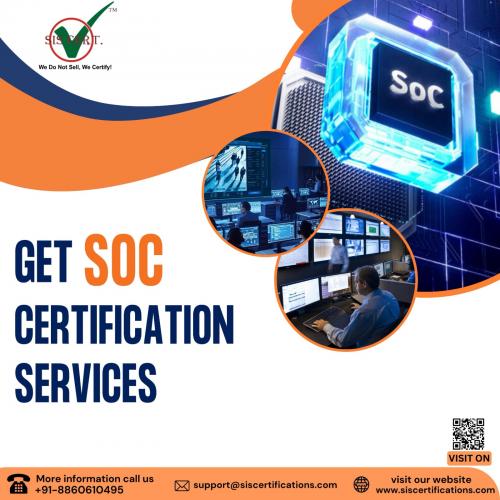The Insider's Guide to SOC Certification: Insider Tips and Tricks

In today's interconnected world,
businesses are increasingly reliant on third-party service providers to handle
critical functions such as data storage, processing, and management. With this
reliance comes the need for assurance that these service providers are
operating securely and reliably. This is where System and Organization Controls
(SOC) certification comes into play. SOC certification provides valuable
assurance to clients and stakeholders that a service organization's controls
are adequately designed and operated effectively to mitigate risks. In this
insider's guide, we'll explore everything you need to know about SOC
certification, along with some insider tips and tricks to streamline the
certification process.
Understanding SOC Certification
SOC
certification is issued by certified public accounting (CPA) firms
and is based on the American Institute of Certified Public Accountants (AICPA)
SOC reporting framework. There are three main types of SOC reports:
SOC 1: Focuses on controls relevant to financial reporting.
SOC 2: Evaluates controls relevant to security, availability,
processing integrity, confidentiality, and privacy.
SOC 3: Similar to SOC 2 but provides a general-use report that can
be shared publicly.
These reports provide valuable
insights into a service organization's internal controls, helping clients
assess the risks associated with outsourcing services.
Who Needs SOC Certification?
Any service organization that
handles sensitive data or provides critical services to other businesses may
benefit from SOC certification. This includes data centers, cloud service
providers, software as a service (SaaS) companies, managed service providers
(MSPs), and more. SOC certification is particularly crucial for organizations
seeking to build trust with clients and demonstrate their commitment to
security and reliability.
Insider Tips and Tricks for SOC Certification
Start Early and Plan Thoroughly: SOC certification can be a
time-consuming process, so it's essential to start early and develop a
comprehensive plan that outlines the steps involved, including scoping, gap
analysis, remediation, and audit preparation.
Scope Definition is Key: Clearly define the scope of the
SOC engagement, including the services provided, systems involved, and
boundaries of the assessment. A well-defined scope ensures that the audit
focuses on the relevant areas of the organization.
Implement Strong Internal Controls: Prioritize the
implementation of robust internal controls that address the criteria outlined
in the applicable SOC framework. This may include controls related to access
management, data encryption, incident response, and change management.
Document Everything: Comprehensive documentation is crucial for SOC
certification. Document your policies, procedures, and controls thoroughly,
ensuring that auditors have clear evidence of compliance.
Conduct Regular Assessments: Perform regular internal
assessments and audits to identify and address any gaps or weaknesses in your
controls before the official SOC audit. This proactive approach can help
streamline the certification process and minimize the risk of non-compliance.
Engage with Experienced Professionals: Consider partnering with
experienced consultants or advisors who specialize in SOC compliance. Their
expertise and guidance can prove invaluable in navigating the certification
process and ensuring success.
Stay Up-to-Date with Regulatory Changes: SOC
compliance requirements may evolve over time, so it's essential to stay
informed about any updates or changes to the SOC framework and adjust your
controls accordingly.
Conclusion
SOC certification is a valuable
assurance mechanism that provides clients and stakeholders with confidence in a
service organization's controls and processes. By following the insider tips
and tricks outlined in this guide and investing in robust internal controls and
documentation, organizations can streamline the certification process and
demonstrate their commitment to security, reliability, and compliance. Ultimately,
SOC certification is not just about obtaining a seal of approval but also about
building trust and credibility in an increasingly competitive market landscape.
Post Your Ad Here
Comments